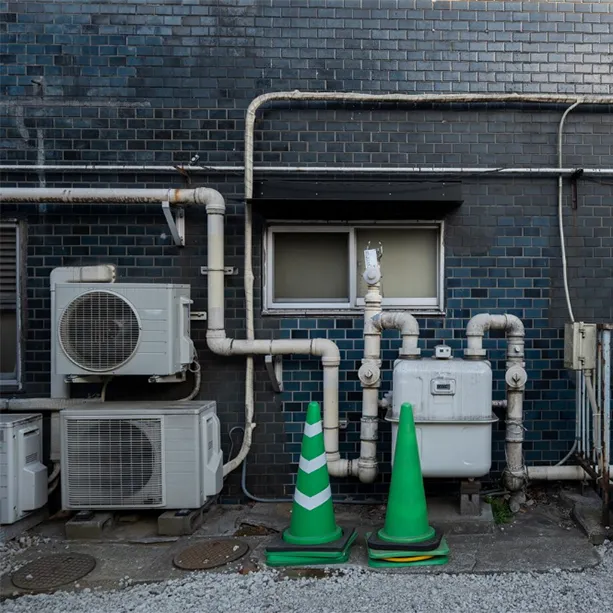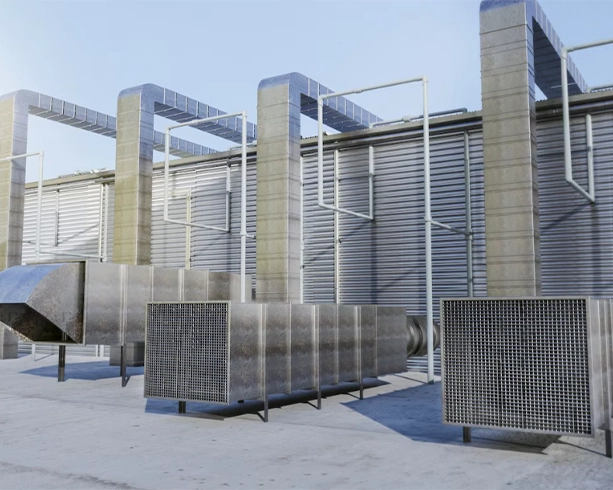Industrial cooling systems are of critical importance in sectors such as food storage, chemical processing, and pharmaceutical production. These systems are used for purposes such as preserving products without spoilage, carrying out production processes under optimal temperature conditions, and increasing energy efficiency. Cooling systems equipped with advanced technology can be customized according to different capacities and cooling requirements.
Industrial cooling systems are equipped with advanced control mechanisms for precise temperature control and humidity level adjustments. This ensures that product quality is maintained at the highest standards. The design of these systems has a significant impact on system efficiency and sustainability. Environmentally friendly cooling systems, which aim to reduce energy consumption and minimize environmental impact, are becoming increasingly important every day.
Cooling systems help businesses reduce operational costs while also facilitating compliance with legal requirements. Industrial refrigeration systems are important not only in terms of technical performance but also for economic and environmental sustainability.
The sectors where these systems are widely used include:
What are Industrial Cooling Systems?
Industrial refrigeration systems are complex technologies used to preserve product quality, optimize processing procedures, and control certain chemical reactions. These technologies provide the cooling capacity needed for industrial facilities using various cooling techniques and equipment.
An industrial cooling system is designed for large-scale cooling needs. These systems function at high standards in terms of energy efficiency and performance. Cooling equipment consists of compressors, condensers, and evaporators. The integrated operation of these components is necessary to achieve the desired cooling effect.
Cooling systems, working compatibly with ventilation systems, control the quality and temperature of the air, making production areas healthier and more efficient. This allows employees to work in a more comfortable environment while ensuring products are stored and processed under optimal conditions. Industrial-type cooling systems are designed for large-scale facilities with specific needs and to meet the specific cooling requirements of different industrial sectors.

Today, industrial-type cooling systems are an indispensable part of many industrial processes. These systems are critically important for preserving product quality, increasing energy efficiency, and reducing operational costs. With advancing technology, more efficient, environmentally friendly, and economical cooling solutions can be obtained.
For more detailed information on industrial ventilation, cooling, and heating systems, you can contact AIRFAN.
Industrial Cooling Systems Prices
Industrial cooling system prices vary depending on the type, capacity and installation requirements of the system. The price range is usually determined by the systems used for capacity. These systems are as follows:

- Small-scale air-cooled systems
- Large-scale air-cooled systems
- Medium-sized air-cooled systems
- Water cooled systems
- Absorption cooling systems
- Customized design and high capacity systems
At the same time, apart from the quality of the equipment, options such as the layout of the facility, installation cost, operating costs are also decisive in the prices.
The energy efficiency of this cooling system is also one of the determining factors that make a difference in prices. For these reasons, it is recommended to choose the system suitable for the area to be used and to get expert consultancy with an accurate cost analysis.
Industrial cooling systems are used in many areas from the food industry to the pharmaceutical industry. It is one of the systems used for efficient storage of products without spoiling.
The types of industrial cooling systems are as follows:
- VRV air conditioner
- Chiller system
- Evaporative
- Penthouse
- Centralized system

Industrial refrigeration systems are systems that control the temperature and provide the desired conditions in different industrial processes. It consists of compressor, condenser, evaporator and expansion valve components.
These systems vary according to different application areas and needs.
Cooling systems should also be considered in terms of energy efficiency and environmental impacts. The correct design and use of these systems reduces costs and provides long-lasting use.
What are the Advantages of Industrial Cooling Systems?
These cooling systems have critical roles in managing industrial processes and improving their safety. The advantages of cooling systems are as follows:
With this system, the heat generated in industrial production processes is removed from the environment. Thus, production efficiency increases.
Effective in maintaining product quality. Its use is especially critical in sectors such as food and pharmaceuticals.
High temperatures can cause industrial equipment to break down. With the use of this cooling system, it is ensured that the equipment works for a long time without deterioration.
These systems are manufactured to optimize energy efficiency. This reduces operating costs. It also reduces environmental impacts.
Apart from all these, there are also effects such as improving working conditions. They also control environmental parameters and are versatile and sustainable.
Cooling System Industrial
In the world of industrial cooling, effective solutions are essential for maintaining optimal operating temperatures in various processes. Cooling systems play a crucial role in chemical processing, ensuring that heat-sensitive reactions and equipment are maintained at safe temperatures.
Water cooling systems and air-cooled systems are two common methods used in industrial settings. Below are key types of industrial cooling solutions:
Efficiently transfer heat from industrial processes, typically through heat exchangers or cooling towers. These systems are favored in applications that require rapid and continuous heat dissipation.
Utilize air as the cooling medium, offering high efficiency and energy-efficient solutions, particularly in areas where water resources are scarce or water conservation is prioritized.
Designed specifically for tasks such as cooling reactors, compressors, or other equipment that generates heat during industrial operations.
When selecting a piece of equipment for industrial cooling, factors like high efficiency, energy consumption, and the specific requirements of the process are crucial.
Customized cooling solutions are essential to ensure safe operating temperatures and reliable performance across various industrial applications. Choosing the right cooling system contributes significantly to the overall productivity and energy efficiency of the industrial facility.
Industrial Cooling System
An industrial cooling system is designed to regulate and remove excess heat generated in industrial processes. In industrial applications, such as chemical processing, effective cooling solutions are vital to prevent overheating and equipment failure.
Among the most widely used systems is the cooling tower, which leverages the cooling power of water to maintain the efficiency of heat-generating machinery. Water cooling systems are particularly popular in industries where large amounts of heat must be dissipated quickly and efficiently.
Alternatively, air-cooled systems offer a more energy-efficient method, especially in areas where water resources are limited. Process cooling is essential for keeping critical operations running smoothly, and the proper piece of equipment must be selected to meet specific industrial needs. Incorporating high-efficiency heat exchangers into these systems enhances performance and minimizes energy consumption.
Whether you are dealing with industrial process cooling or managing a large-scale facility, the right cooling solutions will ensure that systems run smoothly, keeping heat under control and ensuring optimal performance for all your operations.

